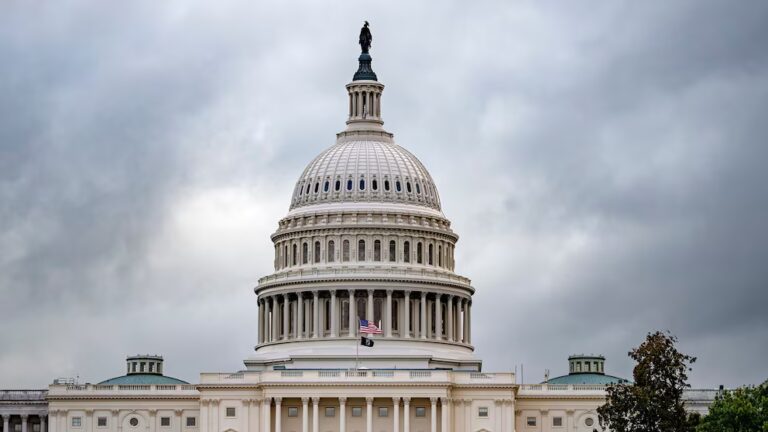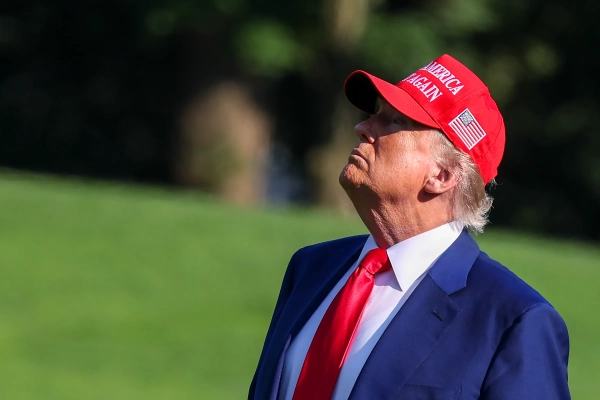The historic impeachment trial of Texas Attorney General Ken Paxton at the state Capitol in Austin wrapped its first week on Friday evening.
Over four days of sometimes intense testimony, multiple witnesses alleged that Paxton, a Republican, had an improper relationship with real estate investor and campaign donor Natin "Nate" Paul by misusing his position to benefit Paul.
In turn, Paul is accused of hiring as an employee the woman with whom Paxton is suspected of having an affair.
Both Paul and Paxton have denied wrongdoing and Paxton has denounced the impeachment proceedings, which were overwhelmingly backed by state House Republicans, as a "sham."
Jury voted to move forward
Attempts by Paxton's legal team to dismiss the 16 articles of impeachment against him, via nearly two dozen pre-trial motions, were unsuccessful: On the first day, the jury of state senators rejected every one of them.
Paxton, via his attorney, Houston household name Tony Buzbee, pleaded not guilty to the impeachment articles, which include constitutional bribery, conspiracy and misappropriation of public resources.
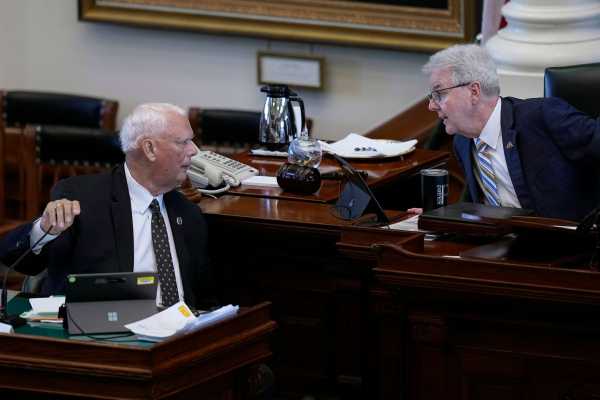
Texas Lt. Gov. Dan Patrick, right, talks with witness David Maxwell, former director of law enforcement at the attorney general’s office, left, as he testifies during day four of the impeachment trial for Texas Attorney General Ken Paxton in the Senate Chamber at the Texas Capitol, Sept. 8, 2023, in Austin, Texas.Eric Gay/AP
The scene at trial
More than 100 spectators could be seen in the gallery above the recessed Senate chamber floor on the first day, and observers continued to stream in over the course of the first week.
Among the seated senators was Angela Paxton, the attorney general's wife, who acknowledged onlookers in the gallery each morning. Though her presence is required daily, she is barred from voting or participating in deliberations due to a conflict of interest.
Her husband was markedly absent from all but the morning proceedings on the first day.
"Neither yesterday nor today has the attorney general graced us with his appearance," prosecuting attorney Rusty Hardin noted for the record on Thursday. Buzbee previously said Ken Paxton's presence was not required, which presiding judge Lt. Dan Patrick agreed with.
Patrick sat at the helm of the Senate floor, in the dais. Flanking each side of him were members of Paxton's defense team, led by Buzbee and co-counsel Dan Cogdell, and the House impeachment managers' prosecution team, led by prominent Texas lawyers Hardin and Dick DeGuerin.
"It's like a Super Bowl of Texas attorneys," one attendee, Tony Robertson, told ABC News on the second day of the trial. Robertson, an involved member of his local GOP, said he is "happy with the [trial] process" thus far and had driven four hours in order to witness the proceedings.
Who spoke and what they said
Opening remarks were given by each side's counsel on day one.
Buzbee addressed what he called the "elephant in the room," referring to the allegation of the affair and subsequent job setup, saying "it doesn't hold any water."
Buzbee also addressed a 2018 donation Paul made to Paxton's campaign, which the House impeachment managers' counsel has argued is evidence of a bribe: "If campaign donations were bribes, everybody in this town would be impeached."
Additionally, the lawyer took aim at state House Speaker Dade Phelan, who presided over the process of bringing impeachment articles, calling him a "drunken speaker seeking political vengeance."
Phelan has defended his actions to investigate Paxton but has not personally commented on the allegation of impairment, though a spokesperson previously likened such criticism to a "last ditch effort to save face."
Dan Cogdell, another member of Paxton's counsel, told senators: "I have one simple ask: Do the right thing … and the right thing is to vote not guilty."
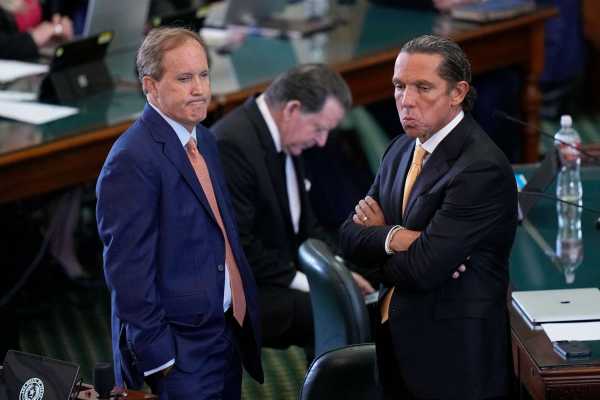
Texas state Attorney General Ken Paxton, left, stands with his attorney Tony Buzbee, right, before his impeachment trial in the Senate Chamber at the Texas Capitol, Sept. 5, 2023, in Austin, Texas.Eric Gay/AP
Republican state Rep. Andrew Murr, who led the House investigation of Paxton earlier this year, gave the House impeachment managers' opening statement. Murr told the senators that Paxton "turned the keys of the office of attorney general over to Nate Paul." Buzbee responded that Murr's statement was "totally false" and promised evidence supporting that "Ken Paxton got nothing from Nate Paul and Nate Paul got nothing from Ken Paxton."
Quoting Sam Houston, Murr urged senators to "do right and risk the consequences."
Four whistleblowers and former employees in Paxton's office took the stand throughout the first week: Jeff Mateer, Ryan Bangert, Ryan Vassar and David Maxwell, all of whom testified they witnessed Paxton have an improper relationship with Paul.
Repeatedly, Paxton's defense suggested the three rushed to report their suspicions to the FBI — which is also investigating both Paul and Paxton — before addressing their concerns with Paxton. Paul pleaded not guilty to eight counts of lying to lenders after he was federally indicted earlier this summer.
Buzbee responded to the charges in a statement, writing, "The charges against Paul evidently have nothing to do with Attorney General Ken Paxton. Nothing whatsoever. That should speak volumes as to how weak this impeachment effort is."
In a cross-examination of Mateer, Buzbee asked the former staffer, "Is it possible that you jumped to conclusions really fast?" Mateer, while admitting he "made some reasonable assumptions," responded that he did indeed speak to Paxton before reporting him to federal officials.
Mateer testified he and the attorney general's staff knew Paul was a "bad guy," also telling jurors that Paxton's alleged affair was relevant because "it answered that question: Why is Paxton engaging in all these activities" to help Paul? Both Paxton's defense and Paul have denied accusations of bribery.
Bangert took the stand and said Paxton was "acting like a man with a gun to his head" when he asked staffers to scramble and re-write a legal opinion to put a halt to foreclosure sales, which Bangert said he knew would benefit Paul, who had multiple properties facing foreclosure. Buzbee dismissed this "so-called midnight opinion" as "utter foolishness."
Mateer testified at one point that he, too, was concerned by the attorney general's behavior, saying he initially thought Paxton may have been blackmailed, to which the defense used to illustrate their argument that the whistleblowers went to the FBI on their "good faith beliefs" instead of evidence.
Bangert told the jury that during a busy time for their office, amid the COVID-19 pandemic and a lawsuit against Google, "We were devoting far more resources to Nate Paul than we ever should have, given the importance of those issues."
Thursday morning, prosecuting attorney Hardin explicitly got at his opposition's lines of questioning by asking Bangert about the order in which the whistleblowers acted.
"Concerns were raised repeatedly and consistently by multiple members of senior staff over the course of several months. There is no question in my mind based on my personal experience with him [Paxton] that he was well aware of our objections," Bangert said.
"We had no evidence that we could point to, but we had reasonable conclusions that we could draw," Vassar testified during a forceful cross-examination by one of the defense's attorneys, Mitch Little, on the afternoon of the third day of the trial.
A heated Little continued to probe Vassar, who had served as a deputy attorney general under Paxton, if he felt he "owed" Paxton a phone call prior to reporting Paxton to the FBI "without any evidence."
"I would disagree that we didn't have any evidence, just based on our beliefs. But I don't think I owed … Paxton anything," Vassar responded. "I wouldn't do anything else differently," he added.
Unlike the previous two whistleblower witnesses, Vassar was a part of a 2020 lawsuit claiming Paxton fired employees out of retaliation. (Paxton later settled that suit but admitted no wrongdoing.)
"He [Paxton] told us that he had spoken personally with Mr. Paul. He said that he believed that something bad had happened to Mr. Paul. He felt that Mr. Paul was being railroaded by the FBI and by [Texas state law enforcement]. And … Paxton said that he didn't trust law enforcement. He asked us to find a way to release the information that had been requested to be withheld," testified Vassar, commenting on the so-called "midnight opinion" Paxton asked staffers to write up in favor of Paul — an ask which whistleblowers said would later, in part, compel them to come forward with their allegations of abuse of office.
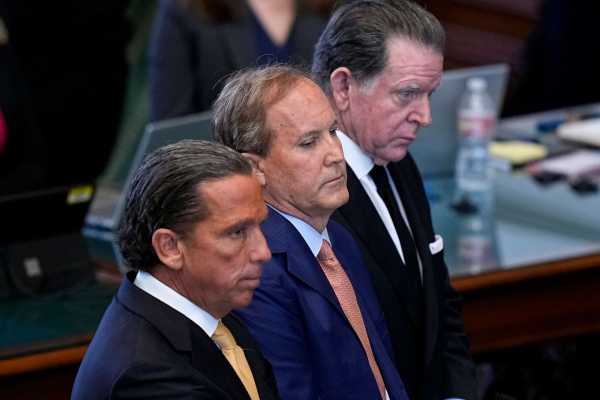
Texas state Attorney General Ken Paxton, center, stands between his attorneys Tony Buzbee, front, and Dan Cogdell, rear, as the articles of his impeachment are read during the his impeachment trial in the Senate Chamber at the Texas Capitol, Sept. 5, 2023, in Austin, Texas.Eric Gay/AP
Earlier in the day, Vassar was given a tissue after becoming choked up when asked by Hardin about Paxton's characterization of him as a "rogue employee," responding with a trembling voice that the statement was "contrary to the years I dedicated my life to the state."
On Friday, a fourth witness, David Maxwell, a former Texas ranger and director of law enforcement for the attorney general's office, took the stand. Like Vassar, Maxwell was a signatory on the lawsuit alleging retaliation.
"My feeling was Nate Paul was a criminal and we should not be associating with Nate Paul," he testified.
What's next
Each side has a total of 24 hours of witness testimony, and the prosecution made a significant dent in that allotment in the first week. Paxton's team has not yet called witnesses.
Each side will also be given 60 minutes of rebuttal evidence and closing arguments.
It is not known how long deliberations will take the jury.
The trial resumed on Monday and is expected to last a few weeks.
If Paxton is acquitted, he will be permitted to continue to serve in the capacity of his third term as attorney general.
If he's convicted, which requires a two-thirds majority vote by the senators, he will be removed from office. Senators may also take a separate vote to determine whether to bar Paxton from serving future office, which would likewise need a two-thirds majority.
The FBI investigation of Paxton is ongoing and the separate trial for Paul, originally scheduled for August, was recently pushed to summer of 2024.
Sourse: abcnews.go.com
